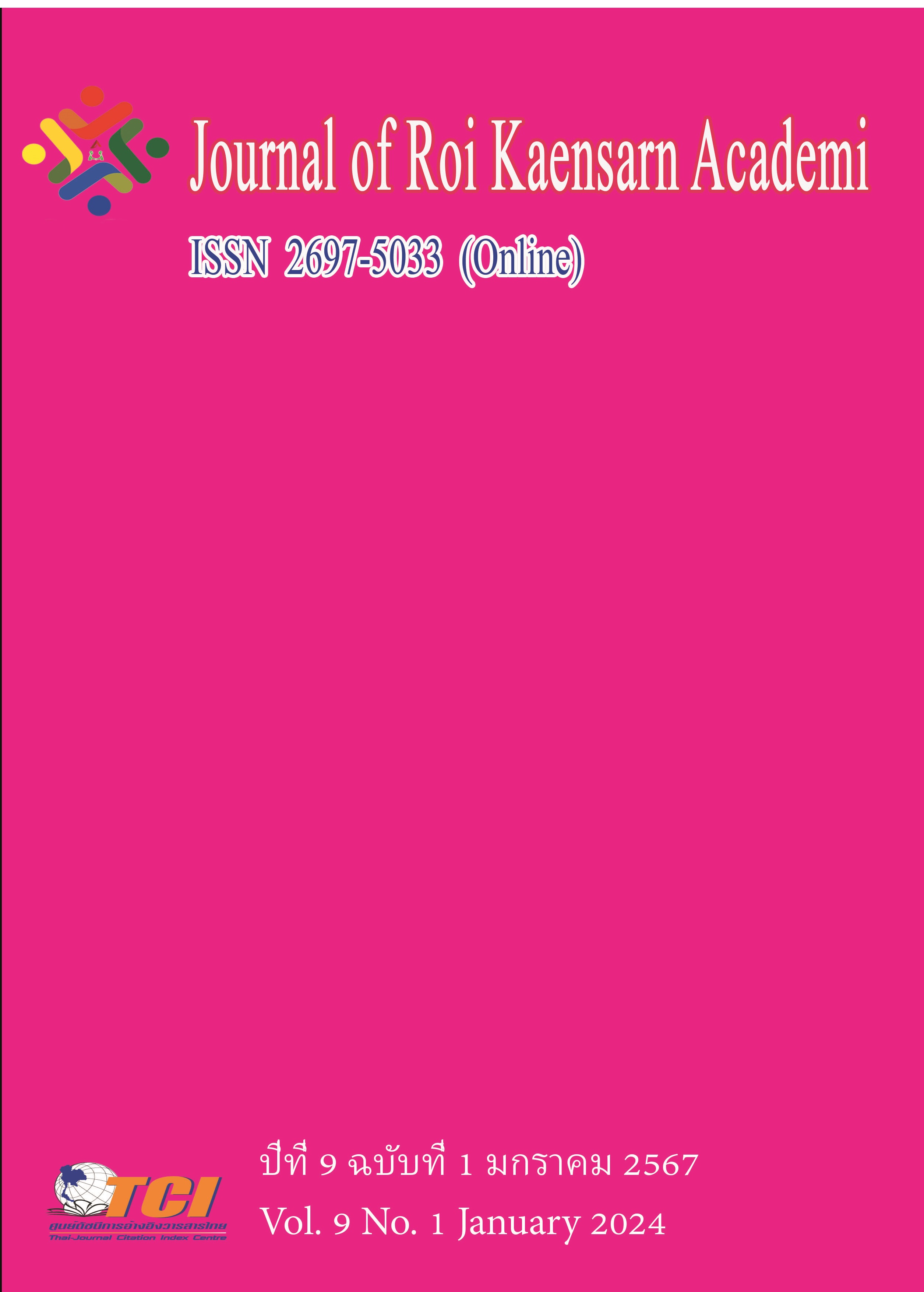อิทธิพลของคุณลักษณะการเป็นผู้ประกอบการและการรับรู้ความสามารถของตนเองในการประกอบการที่มีต่อทัศนคติและความตั้งใจในการเป็นผู้ประกอบการ ของนักศึกษาระดับปริญญาตรี
Main Article Content
บทคัดย่อ
การศึกษานี้เป็นการวิจัยเชิงปริมาณ มีวัตถุประสงค์เพื่อศึกษาระดับคุณลักษณะการเป็นผู้ประกอบการ การรับรู้ความสามารถของตนเองในการประกอบการ ทัศนคติและความตั้งใจในการเป็นผู้ประกอบการ และวิเคราะห์อิทธิพลของคุณลักษณะการเป็นผู้ประกอบการและการรับรู้ความสามารถของตนเองในการประกอบการ ที่มีต่อทัศนคติและความตั้งใจในการเป็นผู้ประกอบการของนักศึกษาระดับปริญญาตรี ทำการวิเคราะห์ข้อมูลจากลุ่มตัวอย่างนักศึกษาระดับปริญญาตรี จำนวน 364 คน วิเคราะห์ระดับของตัวแปรโดย ค่าเฉลี่ย ค่าส่วนเบี่ยงเบนมาตรฐาน และใช้การวิเคราะห์โมเดลสมการโครงสร้างในการวิเคราะห์อิทธิพลของปัจจัยต่างๆ ที่มีต่อความตั้งใจในการเป็นผู้ประกอบการ
ผลการศึกษาพบว่านักศึกษามีคุณลักษณะการเป็นผู้ประกอบการ ทัศนคติต่อการเป็นผู้ประกอบการ การรับรู้ความสามารถของตนเองในการประกอบการ และความตั้งใจในการเป็นผู้ประกอบการอยู่ในระดับมาก โมเดลอิทธิพลของคุณลักษณะการเป็นผู้ประกอบการและการรับรู้ความสามารถของตนเองในการประกอบการ ที่มีต่อทัศนคติและความตั้งใจในการเป็นผู้ประกอบการมีความสอดคล้องกับข้อมูลเชิงประจักษ์ โดยการรับรู้ความสามารถของตนเองในการประกอบการและคุณลักษณะการเป็นผู้ประกอบการอธิบายทัศนคติต่อการเป็นผู้ประกอบการได้ร้อยละ 48 และการรับรู้ความสามารถของตนเองในการประกอบการ คุณลักษณะการเป็นผู้ประกอบการ และทัศนคติต่อการเป็นผู้ประกอบการสามารถอธิบายความตั้งใจในการเป็นผู้ประกอบการได้ร้อยละ 70 โดยการรับรู้ความสามารถในการประกอบการและคุณลักษณะการเป็นผู้ประกอบการมีอิทธิพลทางตรงต่อความตั้งใจในการเป็นผู้ประกอบการ และมีอิทธิพลทางอ้อมผ่านทัศนคติต่อการเป็นผู้ประกอบการ
Article Details
เอกสารอ้างอิง
ขวัญกมล ดอนขวา ปวงปณต สอบขุนทด วาสนา ทองอยู่ สุไพรินทร์ แน่นอุดร และ แวววิไล เครื่องพาที. (2562). ทัศนคติที่มีผลต่อความตั้งใจในการประกอบธุรกิจ Startup ของนักศึกษาระดับอุดมศึกษาชั้นปีที่ 4 ในจังหวัดนครราชสีมา. วารสารวิชาการและวิจัย มหาวิทยาลัยภาคตะวันออกเฉียงเหนือ. 9 (2), 81-96.
สำนักงานปลัด กระทรวงการอุดมศึกษา วิทยาศาสตร์ วิจัย และนวัตกรรม. (2566). ข้อมูลผู้สำเร็จการศึกษา ปี พ.ศ.2565. ออนไลน์. สืบค้นเมื่อ 13 สิงหาคม 2566. แหล่งที่มา: https://www.info. mhesi.go.th /homestat_cgt_65.php
สำนักงานสถิติแห่งขาติ. (2565). จำนวนผู้ว่างงาน จำแนกตามกิจกรรมทางเศรษฐกิจที่เคยทำมาก่อน ภาค และเขตการปกครอง. ออนไลน์. สืบค้นเมื่อ 13 สิงหาคม 2566. แหล่งที่มา: http://www.nso.go.th /sites/2014/Pages/สำรวจ/ด้านสังคม/แรงงาน/ภาวะการทำงานของประชากร.aspx
อนงค์ รุ่งสุข. (2559). ปัจจัยที่มีผลต่อความตั้งใจที่จะเป็นผู้ประกอบการของนักศึกษาคณะบริหารธุรกิจ มหาวิทยาลัยเทคโนโลยีราชมงคลรัตนโกสินทร์. รายงานการวิจัย คณะบริหารธุรกิจ. บัณฑิตวิทยาลัย: มหาวิทยาลัยเทคโนโลยีราชมงคลรัตนโกสินทร์.
Ajzen, I. (2002). Perceived Behavioral Control, Self-Efficacy, Locus of Control, and The Theory of Planned Behavior. Journal of Applied Social Psychology. 32 (4), 665-683.
Ajzen, I. (2005). Attitudes, Personality and Behavior (2nd ed.). Milton-Keynes: Open University Press/McGraw-Hill.
Amofah, K., Saladrigueset, R., and Akwaa-Seky, E. K. (2020). Entrepreneurial Intentions among MBA Students. Cogent Business amd Management. 7, 1832401
Costa, T. G., and Mares, P. (2016). Factors Affecting Students, Entrepreneurial Intentions of Polytechnic Institute of Setubal: A Cognitive Approach. Revista de Administração, Contabilidade e Economia da Fundace. 7 (1), 102-117.
Cronbach, L. J. (1990). Essentials of Psychological Testing (5th ed.). New York: Harper & Row.
Diamantopoulos, A., and Siguaw, J. A. (2000). Introducing LISREL: A Guide for the Uninitiated. London: Sage Publications.
Doanh, D. C., and Trang, T. V. (2019). Entrepreneurial Self-Efficacy and Intention Among Vietnamese Students: A Meta-Analytic Path Analysis Based on the Theory of Planned Behavior. Management Science Letters, 9 (11), 1847–1862.
Draksler, T. Z., and Širec, K. (2018). Conceptual Research Model for Studying Students’ Entrepreneurial Competencies. Naše Gospodarstvo/Our Economy, 64 (4), 23 – 33.
Dubey, P. (2022). The Effect of Entrepreneurial Characteristics on Attitude and Intention: An Empirical Study among Technical Undergraduates. Journal of Business and Socio-Economic Development. DOI 10.1108/JBSED-09-2021-0117
Fornell, C., and Larcker, D. F. (1981). Evaluating Structural Equation Models with Unobservable Variables and Measurement Error. Journal of Marketing Research, 18 (1), 39–50.
Hair, J. F., Jr., Black, W. C., Babin, B. J., and Anderson, R. E. (2010). Multivariate Data Analysis (7th ed.). Upper Saddle River, NJ: Pearson.
Iqbal, A., Melhem, Y., and Kokash, H. (2012). Readiness of the University Students towards Entrepreneurship in Saudi Private University: An Exploratory Study. European Scientific Journal. 8 (15), 109-131.
Kyndt, E., and Baert, H. (2015). Entrepreneurial Competences: Assessment and Predictive Value for Entrepreneurship. Journal of Vocational Behavior. 90, 13-25.
Liñán, F., and Chen, Y. (2006). Testing the Entrepreneurial Intention Model on a Two-Country Sample. Departament d'Economia de l'Empresa, Universitat Autònoma de Barcelona.
Lumpkin, G. T., and Dess, G. G. (1996). Clarifying the Entrepreneurial Orientation Construct and Linking It to Performance. Academy of Management Review, 21 (1), 135-172.
Paço, A. M. F., Ferreira J. M., Raposo, M., Rodrigues, R. G., and Dinis, A. (2011). Behaviours and Entrepreneurial Intention: Empirical Findings about Secondary Students. Journal of International Entrepreneurship, 9, 20-38.
Palmer, C., Niemand, T., Stöckmann, C., Kraus, S., and Kailer, N. (2019). The Interplay of Entrepreneurial Orientation and Psychological Traits in Explaining Firm Performance. Journal of Business Research. 94, 183-194.
Peterman, N. E., and Kennedy, J. (2003). Enterprise Education: Influencing Students’ Perceptions of Entrepreneurship. Entrepreneurship: Theory and Practice. 28 (2), 129-144.
Pihie, L. and Akmaliah, Z. (2009). Entrepreneurship as a Career Choice: An Analysis of Entrepreneurial Self-Efficacy and Intention of University Students. European Journal of Social Sciences. 9 (2), 338-349.
Ponmani, R. (2015). A Study on Entrepreneurial Attitude Orientation and Intention among Various Categories of Students. Ph.D. Thesis. Online. Retrieved October 10, 2023 . from: https://shodhganga.inflibnet.ac.in/handle/10603/72720
Pramudita, D. P. D. (2021). Entrepreneurship Self-Efficacy, Attitudes towards Entrepreneurship, and Student's Entrepreneurship Interest. Airlangga Journal of Innovation Management. 2 (1), 53-67.
Puni, A., Anlesinya, A., and Korsorku, P. D. A. (2018). Entrepreneurial Education, Self-Efficacy and Intentions in Sub-Saharan Africa. African Journal of Economic and Management Studies. 9 (4), 492-511.
Sitinjak, I. (2019). The Effect of Entrepreneurial Self-Efficacy and Entrepreneurial Competence on the Entrepreneurial Entry Decision and the Success of Start-up MSMEs in Medan City. Jurnal Ekonomi Bisnis dan Kewirausahaan. 8 (3), 204-215.
Schumacker, R. E., and Lomax, R. G. (2004). A Beginner’s Guide to Structural Equation Modeling (2nd ed.). Mahwah, NJ: Lawrence Erlbaum Associates.
Tabachnick, B. G., and Fidell, L. S. (2007). Using Multivariate Statistics (5th ed.). New York: Allyn and Bacon.
Tsai, K. H., Chang, H. C., and Peng, C. Y. (2016). Extending the Link between Entrepreneurial Self-Efficacy and Intention: A Moderated Mediation Model. International Entrepreneurship and Management Journal. 12, 445-463.

